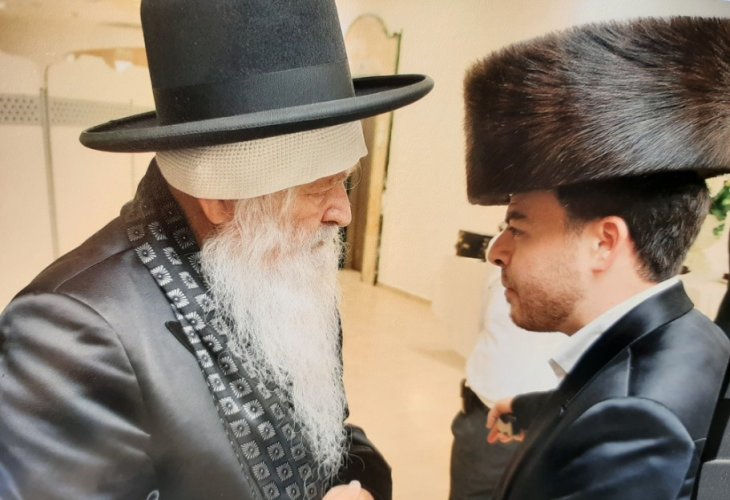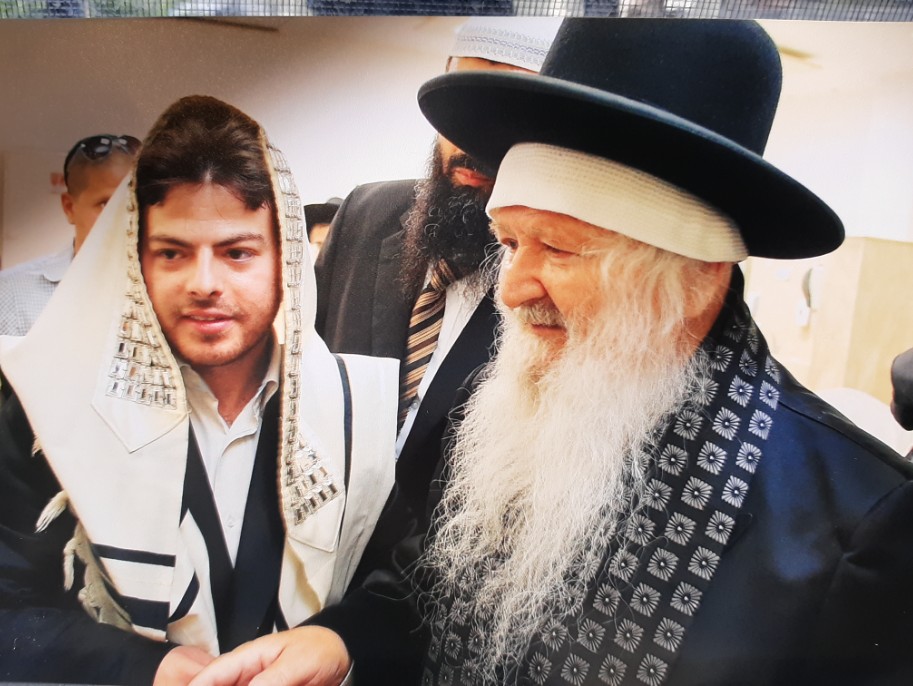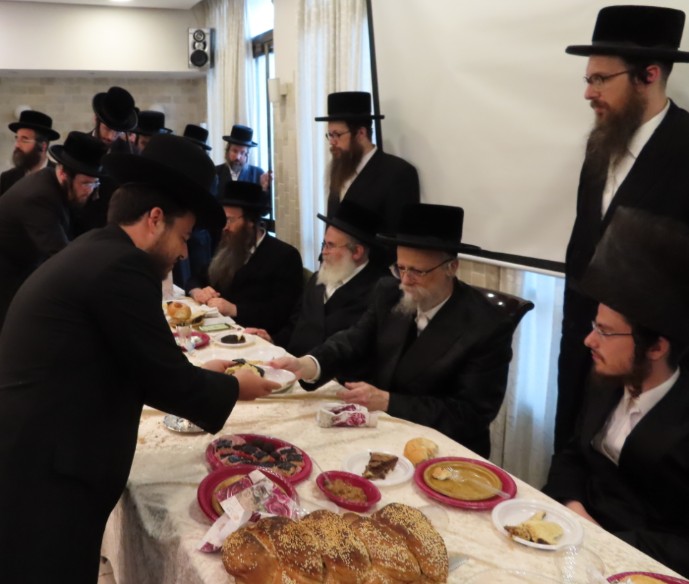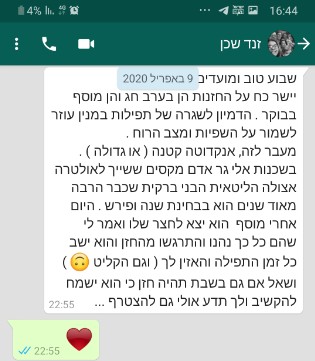Cantor Eli Salomon: "What I've Achieved Through Prayer in My Backyard, I've Never Achieved Before"
Cantor Eli Salomon uses the COVID-19 era to bring joy to others, attending brit milahs on balconies and moving audiences. In a special conversation, he shares the most memorable events he has participated in.
 Cantor Eli Salomon with Grandfather Baba Leon
Cantor Eli Salomon with Grandfather Baba LeonIn an era where synagogues have been replaced by windows and balconies, the beautiful sides of the people of Israel are revealed. One of those individuals bringing joy to the people during this time is Cantor Eli Salomon, affectionately known by many as the "King of the Gatherings." I met him when he arrived at my apartment building to bring joy at a brit milah held on a balcony.
"What I've achieved through the prayer conducted in my backyard, I've never achieved before," he shares excitedly. When I ask him "What exactly did you discover in your yard?", he sits me two meters away and sheds a tear. "In the area where I live, in Givat Shmuel, there are many families who have never heard a prayer in their lives. They've never been to a synagogue, and suddenly the synagogue came to them, to their window. The responses I received from them after the holiday prayers could leave no one indifferent," he adds. I understood there was something more here.
Eli Salomon (33), married and father of three, is from the lineage of the Hassidim of Seret-Vizhnitz. "My grandfather is the famous tzaddik from Bnei Brak, Rabbi Eliyahu Leon Levy of blessed memory, known as 'Baba Leon,' who, beyond being a great cantor, was very knowledgeable in the singing of Makam".
Before I can wonder how he's the grandson of the Hassidim of Seret-Vizhnitz and also the grandson of Baba Leon from Turkish origins, Salomon anticipates: "My mother is Sephardic and my father is Ashkenazi, hence the blend in me that embraces all streams and allows me to incorporate every kind of cantorial style into my prayers, benefiting all the worshipers. No prayer goes by without a worshiper finding a moment of joy."
 Cantor Eli Salomon with Grandfather Baba Leon
Cantor Eli Salomon with Grandfather Baba Leon
Prayer with Tears
Within your balcony cantorship, what moment moved you the most?
"There have been numerous touching moments in the past few weeks that deeply moved me. One involved a neighbor of mine, a Jewish man in his forties, who abandoned the path of Torah, unfortunately. In his youth, he was a prodigy at the Ponevezh Yeshiva, then one day he fell into a crisis that caused him to leave religion entirely. From his window, he saw us beginning prayers in my yard, and all the residents on the street participated from their homes. After several days, he sent a message saying he wanted to barbecue on Shabbat, but didn’t want to upset the religious community, so he asked for the prayer times. But as Hashem says, 'Open for me an opening like the eye of a needle, and I will open for you an opening like a banquet hall,' and what happened since is that the voice of prayer reached his window, entering his home, or more precisely, his heart. He couldn’t withstand it, and came out to the window to join the prayer. He later sent a message: 'For twenty years, I haven’t prayed. I heard the moving prayer, it reminded me of my childhood, I shed tears and cried like a baby.' He wanted to know the prayer times, and since then he's been an integral part of our minyan. How could I remain indifferent?"
Salomon indeed doesn't remain indifferent. It's evident that these stories touch him deeply. "There was another case," he recalls. "During the festival of Sukkot, while I was leading the prayers and Hallel with musical accompaniment, song, and much joy, I suddenly noticed a secular woman standing at the entrance to the yard with a prayer book, praying with great emotion. That's a picture worth paying a fortune for."
And he has many stories. "Last night," he remembers, "a man called me and told me that the next morning his neighbor was having a brit celebration, and there wouldn’t be a minyan, not even family, and due to the counting of the Omer, there wouldn't be music either. He asked if I could come and bring joy to the family. It certainly touched my heart, but on the other hand, I was worried about leaving the house. I consulted with my wife, and after ensuring everything would be done according to health guidelines, I agreed to participate. Today I arrived at the building, and together with all the regional residents, and with the participation of the Angel of the Covenant, Elijah the Prophet, who somehow succeeded in passing all the barricades of Bnei Brak, we brought joy to the family at the brit, with me standing on a neighbor’s balcony, each resident at their window, and the brit held on the father's balcony. Besides him, only the mohel and sandak were there. After the brit concluded, I understood how important it was to have someone to centralize the joy, bringing everyone together in song and joy."
Bringing Joy to a Bereaved Father Who Refuses to Cry
What is interesting in Eli's words is discovering that this isn’t his primary occupation at all, and often, when it involves kindness, the only reward he receives is the joy he brings to others. "I have several independent businesses I run for my livelihood, but at night I make time to sing, play music, and engage in cantorial duties in various places," he explains. "For instance, two months ago, a bereaved father called me, who lost his son to illness a year ago. The anniversary was approaching, but the father did not want his children to be traumatized by the ceremony, so he asked that it be an emotional music gathering with family and friends. I arrived with a few guys, we sang and uplifted spirits. The most moving part was when the father asked me to sing the songs his child loved. Streams of tears flowed. I left feeling I had brought joy to a broken family, easing the tough moments that resurfaced on this anniversary."
When Salomon tells me about the singing gatherings he organizes, I need not ask for proof, as I've personally attended a few. Like the Simhat Beit HaShoeivah (Rejoicing of the Water-Drawing) that took place last Sukkot for special families. I was invited there, and I met Salomon on the guitar and microphone. "Do you remember the Simhat Beit HaShoeivah last Sukkot?" I asked him. "Yes, of course I remember," he responds. "Although every week I partake in such events, I don't forget the touching places I’ve been."

Can you share other memorable places imprinted in your memory?
"Yes. It was just two months ago, before the coronavirus began. I traveled with my wife to Greece. Toward the end of the week, I began searching to see if there was a synagogue nearby, but unfortunately, nada, nothing. And for Eli Salomon, Shabbat without the acceptance of Shabbat as it should be isn't considered Shabbat. "I searched a bit on the internet and saw that there is an ancient synagogue named 'Etz Hayyim,' built about a thousand years ago in 'Chania,' an ancient, beautiful city with old alleys like in Safed, sitting on a stunning port. According to the information I found on the synagogue, it only opens on Friday evening for Kabbalat Shabbat, and the one responsible for that is a Jewish professor from England named Nicholas, the son of a Holocaust survivor from Crete. Nicholas was the one who renovated the synagogue after it was destroyed in the Holocaust, and since then, he operated it. However, sadly, Nicholas passed away a year and two months ago, and since then, the place has been deserted. I didn’t think much, and told my wife, 'We're not staying here. We’re taking a cab to the place where the synagogue is, and we’ll spend Shabbat there.' After three painful hours of traveling and parting ways with three hundred euros, we arrived at the city where the synagogue resides. We rented a room nearby, I put on my vest, and we went to the synagogue. After a few minutes of walking, we finally reached the synagogue, but then my eyes darkened. The synagogue was closed. This was my breaking point. So much travel, effort, and money, all for nothing. I told my wife, there’s nothing to do; at least the two of us will sit on a bench in the port, and say the psalms of Kabbalat Shabbat, and so it was."
Here Salomon appears to tear up as he continues the story. "I sat on the bench and turned to Hashem. 'Father, it can’t be that you brought me here for nothing. It can’t be in vain.' With a spontaneous decision, I decided to return to the place, hoping it was open. To my surprise, it actually was open. Inside sat the 'gabbait,' an older lady, an ex-Israeli named Ahova. I approached her and told her I’m a cantor from Israel, and I would love to conduct Kabbalat Shabbat prayers there. Her excitement over my offer was indescribable. 'Nicholas,' she told me, 'would hold Kabbalat Shabbat here weekly, and ever since he passed, no one has done it. For over a year there’s been no Kabbalat Shabbat here.'
"Tourists from around the world entered, and I earnestly prayed to the Master of the Universe to send me a kosher minyan. Initially, there were forty women but only nine men, yet after a short prayer, another couple from the United States entered. A sigh of relief, 'I have a minyan and can start."
"In those moments, I felt the spirit of the late Nicholas with me, and with tears, I began to sing 'Lechu Neranena.' The prayer that took place was extraordinarily moving. Eastern nuances, together with Carlebach songs. Authentic Hassidic style, with a bit of cantorial flair. Truly a perfect Greek salad. People who had never stepped foot inside a synagogue cried like little children, and I joined them. After the prayer, Ahova approached me with tears in her eyes, requesting that I recite Kaddish in memory of Nicholas, who devoted himself to the synagogue, and never received a Kaddish following his death."

I'm a Cantor, Not a Funeral Director
"When I sing Sephardic songs, I’m more of a Levy than a Salomon," he continues to tell me with a smile, "but since we mentioned the mixing I do with Sephardic singing, I must tell you something."
He pauses for a moment, then begins to detail: "In some of my journeys to communities around the world, I came for the 'Global Shabbat,' to South Africa. I cantored for the Sephardics, and the next day for the Ashkenazim. The local rabbi, who really enjoyed it, invited me to his home, and since then we've had a friendship that later brought about the match of a couple we knew. I told the rabbi I’m continuing my flight to Port Elizabeth and Cape Town. The rabbi said that between Port Elizabeth and Cape Town, there’s the Garden Route, which is a few-day journey, one of the most beautiful areas in the country, and in the middle, there's a seaside settlement called Plettenberg Bay, with a Jewish community of about fifty families without a rabbi. The rabbi suggested connecting me with the head of the community, a man named Gony, so I could be there for Shabbat, strengthen, and cantor for another forgotten community. When I arrived, I discovered the most beautiful place on earth, by the sea. Of course, they made sure I had everything I needed, including food and lodging. On Friday night, the whole community came to the synagogue, about forty people, and I opened with songs and melodies. Initially, they looked at me strangely, but after a few seconds, everyone was dancing to 'Lecha Dodi.' The next morning, they all returned, but this time with their families, to experience the moving prayer again, something apparently that hadn’t happened there in a long time. On Saturday evening, I was informed that over the weekend an elderly community member, childless and alone, had passed. I was requested to conduct a Jewish funeral for him, with all the necessary rites. I quickly called the rabbi back home to instruct me on what to do. I know about music and dancing, not about funerals... And so, I found myself conducting Tahara and a Jewish funeral for a childless Jew, which otherwise would have had to wait several days until a rabbi came from afar. I learned from this that sometimes a person reaches a place, and has no idea why Hashem sent him there until he merits to see the reasons that unfold."

